
2009 Proceedings
2009 Photos
Other Years
Photo Album of the
Stereoscopic Displays and Applications XX (2009) Conference
The Demonstrations
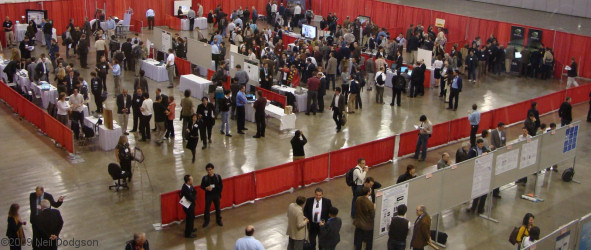
[0] A view of part of the demonstration and poster session in action.
This year the following 3D hardware and software products were on show at the demonstration session:
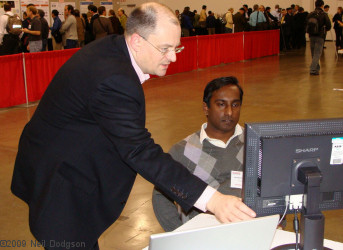
[1] University of Durham, UK (Geng Sun and Nick Holliman) used a Sharp LL-151-3D 15" autostereoscopic display to demonstrate their study, which empirically evaluated three depth mapping approaches.
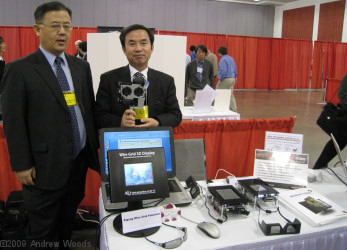
[2] Pavonine, Korea (Keith Park and Sung Jung Lee) showed a prototype 5.5" wire-grid micro-polarizer stereoscopic 3D display viewed using passively
polarized 3D glasses and two other prototype 3D displays.
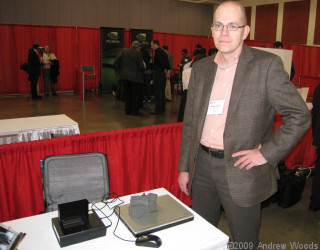
[3] Fraunhofer Institute for Photonic Microsystems, Germany (Michael Scholles)
showed an autostereoscopic 3D display with an OLED backlight that allowed
multi-user display without reduction of geometrical resolution.
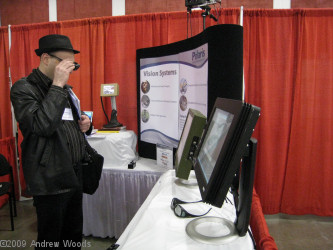
[4] Polaris Sensor Technologies, USA (Rich Edmondson and Larry Pezzaniti)
demonstrated several stereoscopic flat panel 3D display systems, with live
and digital inputs, viewed using passively polarized 3D glasses, and two
stereoscopic video camera systems.
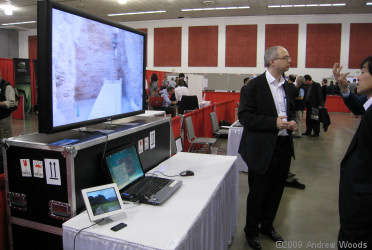
[5] Philips 3D Solutions, The Netherlands (Bart Barenbrug and Rene Klein
Gunnewiek) showed a WOWvx large screen autostereoscopic 3D display
capable of rendering the new 2D+depth format extension presented at the
conference, as well as a smaller autostereoscopic 3D photo-frame display.
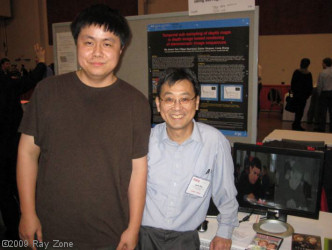
[6] Communications Research Center, Canada (James Tam) showed autostereoscopic images converted from 2D DVD in real-time on a 20" Philips
3D monitor.
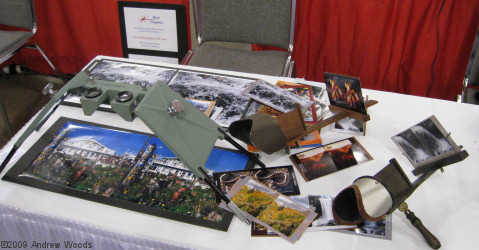
[7] HoloGraphics, California (John and Brian Toeppen) showed a stereoscopic
digital still camera rig using a pair of Canon cameras and StereoData Maker
software, as well as a large collection of stereo-pairs viewed using a selection
of stereoscopes.
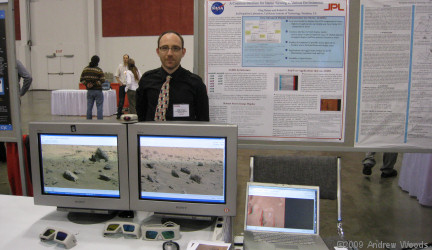
[8] Caltech/JPL, California (Oleg Pariser) demonstrated a new software
infrastructure for building stereoscopic display applications in Java, and
several applications for stereo viewing utilizing imaging data from NASA Mars
surface missions. A stereoscopic panorama of the surface of Mars was
viewable across two Sony monitors using NuVision LCS 3D glasses.
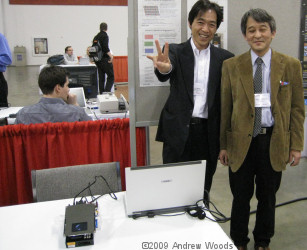
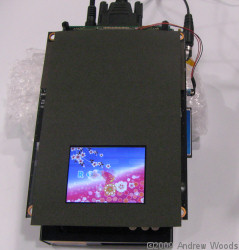
[9a,b] Tokyo University of Agriculture & Technology, Japan (Yasuhiro Takaki) and Seiko Epson Corporation, Japan (Tomio Sonehara) showed a 16-view
autostereoscopic 3D display using a slanted pixel structured LCD panel.

[10] Kanagawa Institute of Technology, Japan (Kazuhisa Yanaka) used a
notebook computer with fly’s eye lenses to show simple 3D objects consisting
of a few triangles, rendered and displayed autostereoscopically in real time.
Two autostereoscopic still images were also on display using this same
method.

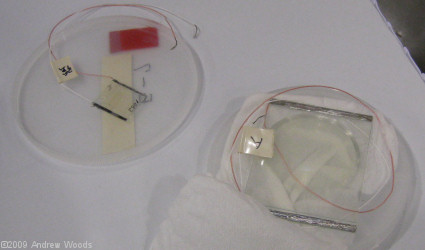
[11a,b] Tokushima University, Japan (Shota Wakita and Hirotsugu Yamamoto)
demonstrated a high-speed liquid-crystal optical deflector suitable for 3D
display.
[photo needed - please submit]
[12] Hewlett-Packard Company, California (Harlyn Baker) made a valiant attempt to setup a multiple projector autostereoscopic 3D display for teleconferencing
purposes, but encountered some technical hurdles.

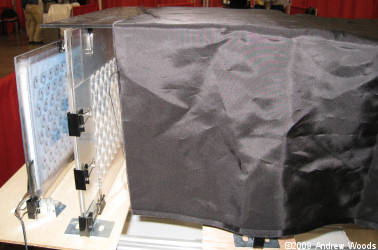
[13a,b] University of Tsukuba, Japan (Hideki Kakeya) demonstrated a coarse integral
volumetric imaging display that can show autostereoscopic images without
contradiction between convergence and accommodation.

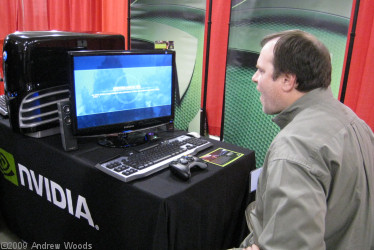
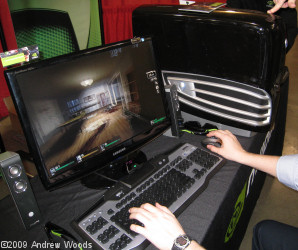
[14a,b,c] NVIDIA Corporation, California (David Cook, Andrew Fear, and Michael McSorley) showed high-quality stereoscopic 3D gaming rendering on two Samsung 2233RZ 120 Hz 3D LCD monitors, viewed using the new wireless NVIDIA
GeForce 3D Vision LCS glasses driven by a pair of Alienware Gaming PCs. Daniel Merritt (seated in image 14a) gave the system a thorough workout.

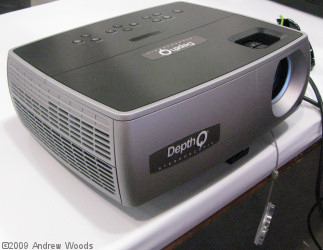
[15] DepthQ Stereoscopic, Washington (Chris Ward and Dan Lawrence)
demonstrated the DepthQ HD 3D projector, viewed using the NVIDIA
GeForce 3D Vision LCS glasses, and driven by a PC running DepthQ
stereoscopic media server software.

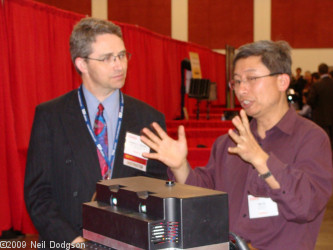
[16a,b] Intravista LLC, California (Wei Su) demonstrated an LCoS 3D front projector
with HD resolution powered by an LED light source, viewed using circularly
polarized 3D glasses. This was the first public demonstration of this new
projector.

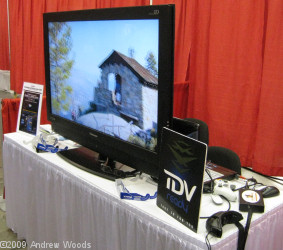
[17a,b] TDVision Systems, Illinois (Ethan Schur) used a Hyundai 46” Vuon 3D LCD,
viewed using circularly polarized 3D glasses, to demonstrate TDVision’s
stereoscopic software solutions for stereoscopic video encoding (TDVision
Codec), gaming and virtual worlds, as well as the TDVisor stereoscopic head
mounted display.

[18] ETRI (Electrical and Telecommunications Research Institute), Korea (Gwang Soon Lee and Bong Ho Lee) used two handheld devices with
autostereoscopic screens to demonstrate a DIBR(Depth Image Based
Rendering)-based 3D DMB (Digital Multimedia Broadcast) service, which
provides 3D mobile broadcasting service using DIBR technologies over
Terrestrial DMB.

[19] Bare Hill Software Company, New York (Richard Bolton) demonstrated a
personal stereographic viewer for 2D digital images and video.
There were also several stereoscopic items at the Electronic Imaging Exhibition in the main concourse on Tuesday and Wednesday:

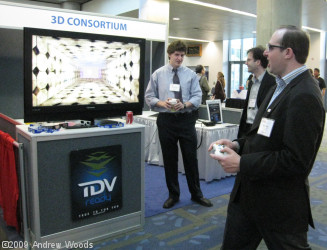
[20a,b] The 3D Consortium (Japan) facilitated the exhibition of stereoscopic products
from member companies: TDVision Systems (Illinois) showed a similar setup to
their demonstration session booth described above, and Mark Resources (California) demonstrated a 60" diagonal full-color autostereoscopic 3D
backlit transparency print of fluorescent minerals.

[21] NHK Enterprises America (NEPA) (Japan) demonstrated their stereoscopic 3D
HD content acquisition services and 3D HD content library using a JVC 46” 3D
LCD micro-polarizer monitor, viewed using circularly polarized 3D glasses.

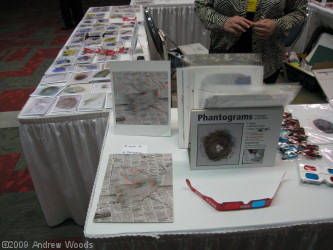
[22a,b]Also in the exhibit area was the annual Phantogram Exhibit, organized by Terry
Wilson from Terryfic3D. As well as showing a
vast collection of Terry’s own 3D phantograms, the exhibit included works from
the following phantogram artists: Gilbert Detillieux, Dennis Wiens, David Kesner,
Jim Gasperini, Dan Jacob, Barry Rothstein, Shab Levy, and John Ballou.

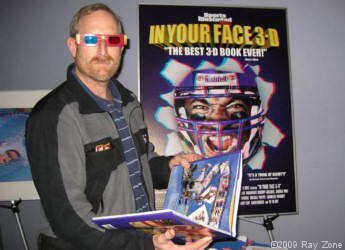
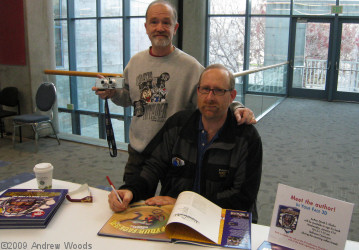
[23a,b,c] Throughout the conference we were fortunate to have on exhibit almost two dozen
large framed anaglyph 3D prints from the book, In Your Face 3D, by David
Klutho. Seeing the long line of 3D prints setup along the wall outside the
conference room was certainly an impressive sight. A book signing was also
organized during the conference for attendees to get the book personally
autographed.
All photographs © 2009 Andrew Woods, Neil Dodgson, or Ray Zone as noted.
Higher resolution and 3D images available upon request.
